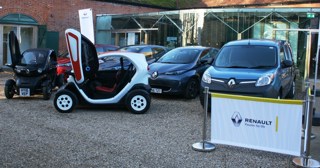Conflicting messages about the future of diesel and contradictory advice on how and when to introduce alternative fuel vehicles are not helping companies make sensible decisions about their fleets.
That’s according to John Lawrence, managing director at CLM Fleet Management.
He said: “We’re seeing many organisations that are struggling to get to grips with the everyday practicalities of running their fleet in the midst of the debate over fuels.
“When you’re trying to make sensible decisions about managing costs, keeping the business mobile and helping drivers to reduce their tax burden, it’s not helpful to have so much noise.”
CLM, which manages more than 15,000 vehicles in the UK, has been working closely with its clients in an attempt to filter out some of this noise and ensure a clear focus on the fundamentals. These include an emphasis on wholelife costs and ensuring that the right vehicles are selected for the right roles and journey patterns.
Lawrence added: “Whole life costs remain the key measure for any fleet and optimising this means taking a flexible approach to vehicle and fuel selection. Leasing companies are currently taking very different residual value positions depending on manufacturer, model and particularly fuel type.
“From a vehicle acquisition perspective, this means that if you’re not shopping around for the best deal on each individual vehicle you’re likely to be paying too much. Offerings like our own Smartpanel funding solution mean you’ll at least have the flexibility to pick the leasing company with the best price for the vehicle in question.
“But running costs also vary across the fuel types, so it’s a matter of getting the calculations right based on mileage and how long you intend to run the vehicle. It’s for this reason that we would never advise a client to, for example, switch away from diesels completely because for many situations these remain the most cost-effective choice.”
Lawrence believes this pragmatic approach also works from a mobility perspective.
“If the nature of your business demands a large number of short, urban journeys, then plug-in hybrids or even pure EVs can be the perfect choice,” he said.
“But if you’re covering longer distances, and don’t have the opportunity for charging, then EVs simply aren’t an option and plug-in hybrids become conventional vehicles carrying several hundred kilos of battery packs and electric motors.
“By working closely with your fleet management partner, you should be able to assess journey patterns and crunch the numbers to determine the optimal vehicle mix for the business. We’re not pretending this is rocket science but it’s surprising how many organisations are being poorly advised.”
The current company car tax environment is also leading to conflicts of interests over fuel-type selection that need to be carefully managed, says CLM.
Consider the example of a driver selecting a plug-in hybrid in an attempt to minimise BiK liabilities.
“For a start there’s the higher P11D value to consider. Then you have to look at whether the driver is realistically able to optimise use of the vehicle by maximising the mileage covered in electric only mode. This would mean ideally being able to charge the car both at home and at the workplace,” said Lawrence.
“If this isn’t possible then fuel consumption is likely to be far higher than an equivalent diesel. Where this is the case, fleet managers need to seriously consider whether such drivers should be allowed to choose this type of vehicle.”
He concluded: “There are a lot of changes in our industry at the moment, but this doesn’t have to lead to panic or rash decision-making. By sticking to the basics of good fleet management it means we can take advantage of the opportunities provided by new technologies and avoid the potential pitfalls.
“If people are concerned, there’s a lot of good information and advice out there amongst the commotion and they shouldn’t be afraid to ask for help in seeking it out.”



















Login to comment
Comments
No comments have been made yet.